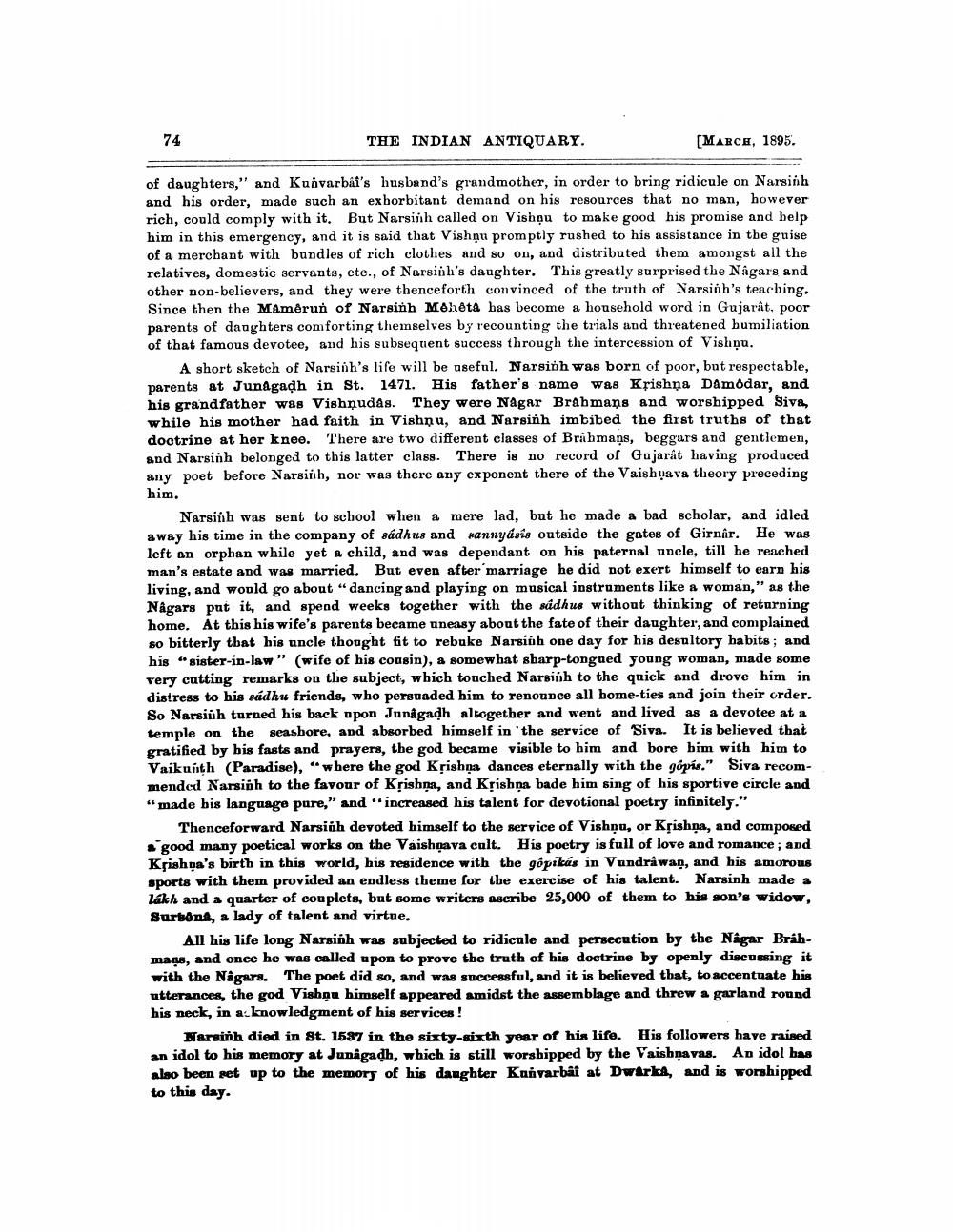________________
74
THE INDIAN ANTIQUARY.
[MARCH, 1895.
of daughters," and Kuivarbái's husband's grandmother, in order to bring ridicule on Narsinh and his order, made such an exborbitant demand on his resources that no man, however rich, could comply with it. But Narsinh called on Vishğu to make good his promise and help him in this emergency, and it is said that Vishņu promptly rushed to his assistance in the guise of a merchant with bundles of rich clothes and so on, and distributed them amongst all the relatives, domestic servants, etc., of Narsinl's daughter. This greatly surprised the Nagars and other non-believers, and they were thenceforth convinced of the truth of Narsióh's teaching, Since then the Mamērun of Narsinh mehta has become a household word in Gujarat, poor parents of daughters comforting themselves by recounting the trials and threatened bumiliation of that famous devotee, and his subsequent success through the intercession of Vishņu.
A short sketch of Narsiüh's life will be useful. Narsińh was born of poor, but respectable, parents at Junagadh in St. 1471. His father's name was Krishna Damodar, and his grandfather was Vishnudas. They were Nagar Brahmans and worshipped Siv& while his mother had faith in Vishnu, and Narsiñh imbibed the first truths of that doctrine at her knee. There are two different classes of Brahmaņs, beggurs and gentlemen, and Narsinh belonged to this latter class. There is no record of Gujarat having produced any poet before Narsish, nor was there any exponent there of the Vaishnava theory preceding
him.
Narsinh was sent to school when a mere lad, but he made a bad scholar, and idled away his time in the company of sádhus and wannyásís outside the gates of Girnar. He was left an orphan while yet a child, and was dependant on his paternal uncle, till he reached man's estate and was married. But even after marriage he did not exert himself to earn his living, and would go about "dancing and playing on musical instruments like a woman," as the Någars put it, and spend weeks together with the sådhus without thinking of returning home. At this his wife's parents became uneasy about the fate of their daughter, and complained so bitterly that his uncle thought fit to rebuke Narsiúh one day for his desultory habits; and his sister-in-law" (wife of his cousin), a somewhat sharp-tongued young woman, made some very cutting remarks on the subject, which touched Narsióh to the quick and drove him in distress to his sádhu friends, who persuaded him to renounce all home-ties and join their order. So Narsiüh turned his back upon Junagadh altogether and went and lived as a devotee at a temple on the seashore, and absorbed himself in the service of Siva. It is believed that gratified by his fasts and prayers, the god became visible to him and bore him with him to Vaikunth (Paradise), “where the god Krishna dances eternally with the gópís." Siva recommended Narsinh to the favour of Kțishna, and Krishņa bade him sing of his sportive circle and "made bis language pare," and "increased his talent for devotional poetry infinitely."
Thenceforward Narsish devoted himself to the service of Vishạn, or Krishna, and composed good many poetical works on the Vaishnava calt. His poetry is full of love and romance, and Krishqa's birth in this world, his residence with the gopikás in Vundrawaņ, and his amorous sports with them provided an endless theme for the exercise of his talent. Narsinh made a lakh and a quarter of couplets, but some writers ascribe 25,000 of them to his son's widow, Surtona, a lady of talent and virtue.
All his life long Narsióh was subjected to ridicule and persecution by the Nagar Brahmars, and once he was called upon to prove the truth of his doctrine by openly discussing it with the Nagars. The poet did so, and was successful, and it is believed that, to accentuate his utterances, the god Vishğu himself appeared amidst the assemblage and threw a garland round his neck, in acknowledgment of his services !
Narainh died in St. 1587 in the sixty-sixth year of his life. His followers have raised an idol to his memory at Junagadh, which is still worshipped by the Vaishnavas. Ap idol has also been set up to the memory of his daughter Kuivarbål at Dwarka, and is worshipped to this day.




